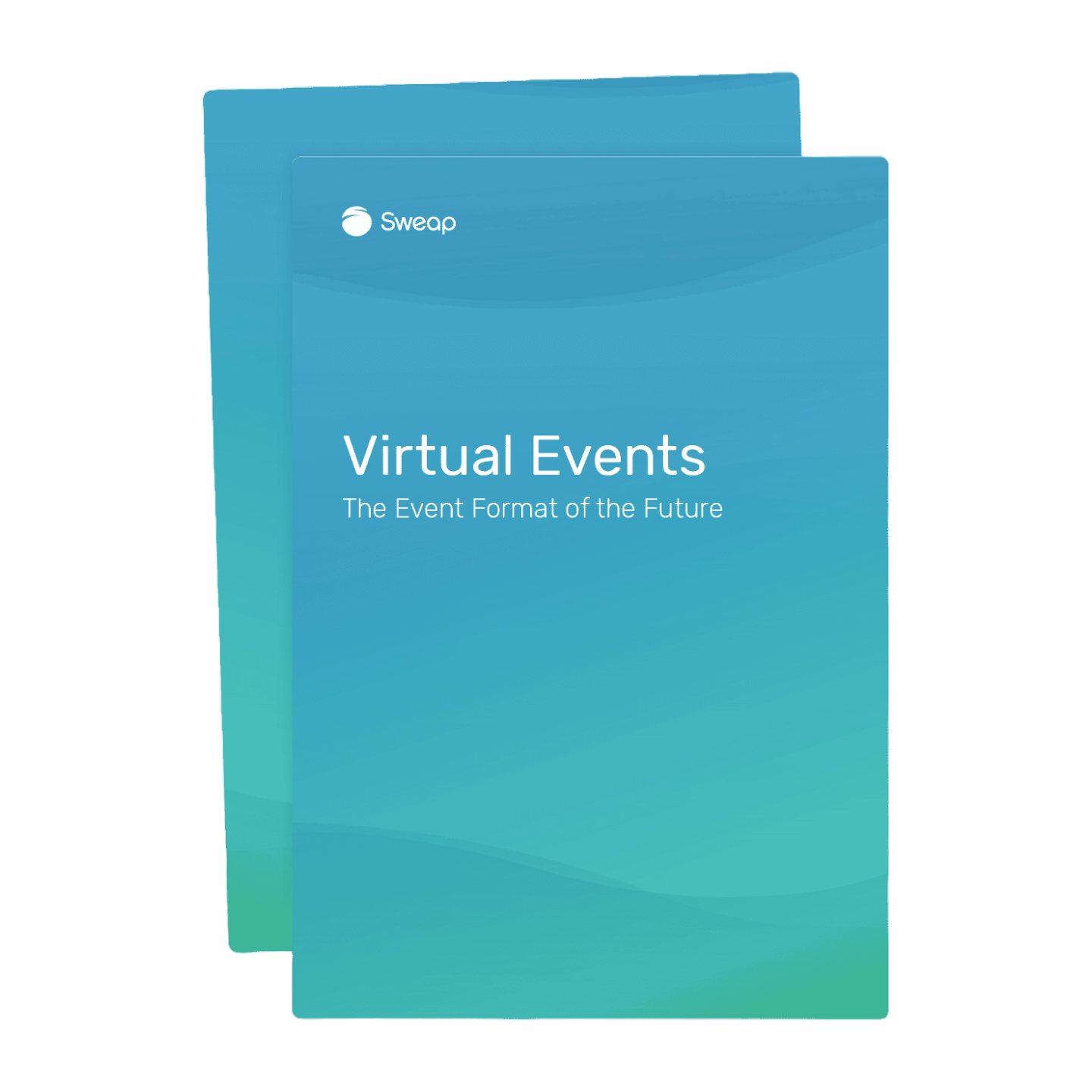
For years, live events have been the backbone of the event industry. Meetings, conferences, and trade shows leverage face to face interactions to meet new leads, build connections and meet sales goals. But times are changing. And virtual events are here to stay. Why? Because virtual events are borderless and more accessible to all.
However, just because an event is online doesn’t mean the same attention to detail and critical thinking are not needed—quite the contrary. Virtual events bring a whole new set of considerations and challenges with them.
This guide will help you succeed. From what is a virtual event to how to put one together in seven steps or less, we’ll teach you how to harness the power of virtual events.
What Is a Virtual Event?
Let’s start with the basics. A virtual, online or digital event is an event that takes place entirely online. This is different from hybrid events, which are partially online and partially in-person.
Thanks to technological progress, there are few limits on the type of virtual event you can host. From a trade fair to a movie premier and concerts to educational webinars, online events allow you to host global experiences for one to two people to multiple thousand attendees.

Why Host a Virtual Event?
The reasons for hosting a virtual event are similar to why you’d host an in-person event: you want to provide people with value, demonstrate your brand’s expertise, connect with leads and existing customers, and, ultimately, drive sales.
Your events should be part of your overarching business strategy and further your goals. However, there are a few key benefits of hosting virtual events:
Versatility of formats - With the right technology at your disposal and some creativity, you can come up with numerous innovative ideas and formats for events. From digital workshops to Ask Me Anything sessions with experts in their field, the world is your oyster.
Lower budget - Online events enable you to skip booking a venue, reserve a caterer and fly in all your speakers. Making them a more cost-effective way of connecting with your audience.
Increased accessibility - Digital events allow you to accommodate attendees who might not otherwise be able to attend due to associated costs or travel limitations. What was once limited to people within 30km of your company HQ now becomes a borderless experience which anyone with an internet connection can join—allowing you to reach your ideal customers anywhere in the world.
Analytics at your fingertips - A virtual vent means you can monitor the most popular sessions, notice when attendees are engaged or not and how long the average attendee stayed for. This information can help you refine future events.
Some of the above benefits also apply to hybrid events. By combining face-to-face interactions with the opportunity for users worldwide to also benefit from your shared knowledge, you can expand your reach and engage with your audience in a borderless manner. The right event management software ensures your hybrid events are a hit and resonate with everyone involved.
What Makes a Successful Virtual Event?
What makes a good online event? It’s all about the experience. Because a virtual event can involve so much more than an individual sitting behind their computer watching people talk to their webcams. The best online events are:
Live and interactive - Do not pre-record a talk and display it to your audience. The best virtual events happen live. Enabling the viewer to connect with the speaker on an emotional level.
Creative - Give your audience opportunities to interact with your brand, the speakers and with each other. Bring them together by including unique ideas to bring your event to life.
Personalized - Your events should bring value to your audience one way or another. Whether that’s by answering a question, addressing a common pain point or entertaining.
True to your brand - Don’t host an online event because everyone else is doing it. Choose an event format, topic and concept that reflects your brand.
How to Plan a Virtual Event?
Simply because an event is being held online doesn’t mean you can throw it together with little regard. The planning process is similar to that of an in-person event. But with a few key differences to keep in mind. The following list is what you need to prepare to host a virtual event.
1. Set a clear goal
Before you pick a date or contact speakers, it’s important to decide on why you are hosting this event. How does it fit into your overall business strategy? Why should your audience attend? What experience do you want them to have, and which KPIs are you hoping to fulfil?
Understanding why you are hosting an online event and what you hope to achieve will guide you in the rest of your planning process. This will narrow down the format you will adopt, the theme of the event and the type of speakers and guests you will invite.
2. Decide on a budget
Depending on the type of event you’re going to host and the kind of experience you want your audience to have, you’ll have to adjust your budget accordingly. For example, if you’re hosting an educational webinar, your budget will most likely be relatively small. However, if you’re organizing a digital festival, you will need to spend more on other elements such as entertainment and world-class speakers.
3. Decide on the technology to use
Based on the type of event you are organizing, you will need certain platforms and features. Tools such as event management software can help you plan, execute and evaluate your event. Whether live streaming, hosting breakout sessions, surveys, chats, virtual networking or collaborating on digital whiteboards and guest list management, event management software will remove some stress by taking care of the back-end and tech aspects.
4. Reach out to speakers
Getting speakers on board is another big task. Start by brainstorming all potential speakers who could fit your criteria and then narrow down your list. Next, consider what you can offer these people in return for their participation. And then, start reaching out to them.
Don’t limit yourself and reach out to only one person. Be sure to have a few options and back-ups if needed.
5. Decide on the content
To keep your audience engaged, you need stellar content. Armed with a theme and potential speakers, time to consider what content will keep your audience engaged. Think about how you want to present the speakers, supporting presentations, graphics and videos in addition to live polls or activities which foster interaction.
6. Promote your event and communicate with your target audience
You want the world to know that you’re hosting an event. So a big chunk of your time will need to be spent on marketing and promoting your virtual event. To do this, use all the tools in your arsenal to spread the word.
Reach out to people organically via social media, create paid LinkedIn campaigns, send out a newsletter to relevant people in your database. Direct people towards a designated event landing page that is filled with relevant details and strong CTA’s that encourage people to sign up. Keep track of attendee status, sign-up and source via smart guest list management.
7. Follow-up with leads after an event
That’s a wrap! Once your event is complete, that doesn’t mean the work is finished. Take a few extra steps and put together a plan to follow up with leads to get the most of your event.
It could be as simple as an email chain that offers a recording of the event and asks for feedback or as elaborate as a nurturing sequence across different touchpoints that spans multiple months.
Whichever option you choose, the aim is to remain connected and stay top of mind.
How to Get Sponsors for Your Virtual Event
If you’re thinking of hosting a large virtual event, sponsors will play a pivotal role to help cover costs and can be easily woven into webinars, videos or other event types. And online events offer many more subtle ways to include company sponsors, from a brand logo included in your event cover image to a company banner embedded in your live stream; the opportunities are numerous.
The key to attracting sponsors and getting them to bite is to provide them with what they want and educate them on the benefits of virtual events. Such a partnership means access to a broad audience worldwide, more engagement opportunities and provable return on investment.
To convince potential sponsors, create a sleek presentation that focuses on what the company will gain by partnering with you. Depending on the type of event and how many sponsors you need, consider offering different sponsorship packages or have organisations sponsor specific aspects, such as the keynote speaker.
Ultimately, a blend of small and large packages ensures you can cater to a wide selection of companies.
How to Make a Virtual Event More Engaging
Now that you know how to put together your next virtual event, how can you be sure that your audience is engaged? The short answer is that you should provide your audience with possibilities to interact and things to do to feel involved.
Here are a few ideas of elements you can include to take your virtual event to the next level:
Include live polls, live chat or Q&A moments - Make people feel a part of your event by asking for their participation. Poll results and questions from the audience help shape the conversation and let you gauge their understanding.
Dedicate time for networking - Depending on your event type, providing attendees time to chat with one another via breakout rooms or in the chat can be of tremendous value. As location is no longer an obstacle, you can bring people together from around the world and enable them to exchange contact details in one click.
Add elements of gamification - Break the ice and make the atmosphere a bit more fun by adding gamification elements. Whether it’s a via quiz or reward-based game, gamification elements are a powerful way to compel people to attend your event, keep attendees engaged and leave people feeling good.
Conclusion
The show must go on. Virtual events may seem daunting, but technology has made the process a lot easier and more accessible. Treat your virtual events the same way you would plan in-person events. Lead with strong content, invite reputable speakers and find ways to engage and interact with your audience.
Looking for more resources to plan the perfect online event? Check out the blogs below. Contact us for more information on how to plan and execute your virtual event perfectly.


